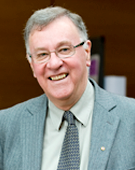
You are here
Honorary Professor Peter McDonald AO
BCom University of New South Wales; PhD Australian National University; FASSA; AM; AO
Primary affiliation: Honorary Professor of Demography, School of Population and Global Health, The University of Melbourne; CEPAR Chief Investigator; Professorial Fellow, Ageing Asia Research Hub, UNSW Sydney
Peter McDonald AO is Honorary Professor of Demography in the Melbourne School of Population and Global Health, University of Melbourne, Emertitus Professor of Demography at the Australian National University, and is a CEPAR Chief Investigator.
From 1995 to 2016, he was Professor of Demography at the Australian National University. Prior to this, he had been Deputy Director(Research) of the Australian Institute of Family Studies for 11 years. He was a Member of the Ministerial Advisory Council on Skilled Migration for 2012 to 2014 and, in 2014, a Member of the Independent Review of Integrity of the Subclass 457 Programme.
In 2017 and 2022, he was a member of the Independent Assurance Panel for the 2016 and 2021 Censuses of Australia. In December 2018, at the invitation of the Prime Minister, he made a presentation on Australian population policy to the Council of Australian Governments (COAG).
In 2015, Peter McDonald was awarded the Irene B. Taeuber Award by the Population Association of America which is given in recognition of an unusually original or important contribution to the scientific study of population or an accumulated record of exceptionally sound and innovative research. He is only the fourth non-American to receive this award. In 2022, he was awarded the Laureate of the International Union for the Scientific Study of Population. The Taeuber Award and the IUSSP Laureate are the two most prestigious international awards in the field of demography. He was President of the International Union for the Scientific Study of Population (IUSSP) for the years, 2010-13.
McDonald was awarded an Officer of the Order of Australia in 2024, and a Member of the Order of Australia in 2008. In 2018, he was the coordinating author of the United Nations State of World Population Report 2018. He is a Fellow of the Academy of Social Sciences in Australia.
He is frequently consulted on the issue of population futures (causes, consequences and policies) by governments around the world, especially in Australia, Europe and East Asia. His theoretical and policy-oriented research on low fertility (the gender equity theory of fertility) is widely cited and has informed government policy-making in several countries.
Keywords: Demography; Immigration; Fertility; Labour Force; Australia; Indonesia
More: View University of Melbourne profile
